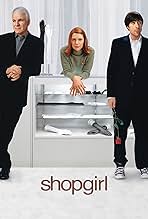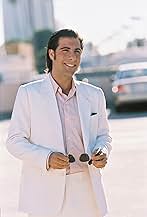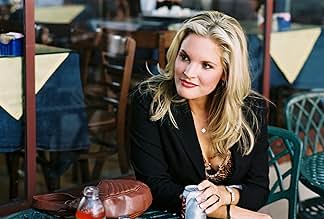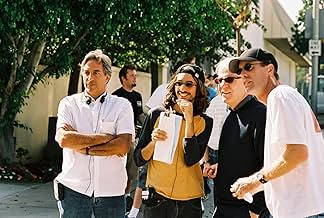CALIFICACIÓN DE IMDb
6.3/10
25 k
TU CALIFICACIÓN
Muestra un complejo triángulo amoroso entre una vendedora aburrida, un rico hombre de negocios y un joven sin rumbo.Muestra un complejo triángulo amoroso entre una vendedora aburrida, un rico hombre de negocios y un joven sin rumbo.Muestra un complejo triángulo amoroso entre una vendedora aburrida, un rico hombre de negocios y un joven sin rumbo.
- Premios
- 1 premio ganado y 7 nominaciones en total
John Fedevich
- Hot Tears Band Member
- (as Johnny Fedevich)
Opiniones destacadas
Edward Hopper was the great painter of urban loneliness. Shopgirl had two perfectly composed and lit shots that could pass for Hopper paintings -- the one where we first see Mirabelle behind the glove counter at Saks, and the one where she solves the problem of how exactly to cross the intimacy threshold with Ray for the first time. Both involve the display of exquisite merchandise to customers who have excellent taste but don't quite appreciate the full value of what's being offered.
The relationship between Ray and Mirabelle is, of course, a transaction. Ray is what used to be called a sugar daddy. He knows it, and within the limits of that role he is apparently a generous and considerate keeper. We aren't given Ray's back story, but it is not hard to guess that a symbolic logician who made a fortune in computers might have been socially challenged, to put it mildly, as a young man, and suffered a good deal of rejection from women. He can now buy what he couldn't then woo, but experience has taught him never to relinquish control and never to let himself be vulnerable. A few hundred million dollars have cleaned up his exterior nicely and given him power over his surroundings, but the inner nerd is still there.
Mirabelle certainly appreciates the value of what Ray can do for her. Consider the shot in Vermont where she gazes at her dried out, prematurely worn mother and decides she'll meet Ray in New York after all. But Mirabelle refuses to admit to herself that she is only being kept. We are meant to think the better of her for her self deception. The sluttish, annoying and frankly mercenary but cheerfully self aware Lisa is there to draw an unfavorable contrast with Mirabelle. Paradoxically, it is Mirabelle's self-deceived integrity, and her refusal to use the crude manipulations Lisa suggests, that make her a more exquisite ornament for Ray -- gourmet arm candy for a man with the finest taste. Both women are punished for self deception, but Lisa suffers only comic humiliation while Mirabelle sets herself up for real pain.
Jeremy has the makings of a Ray in him, but we are meant to believe that he has -- implausibly -- attained emotional enlightenment, if not the capacity for articulate speech or sustained rational thought. He has earned Mirabelle, we are told, because he has remade himself to be worthy of her. Love may not conquer all in this bittersweet anti-romance, but it still does better than break even.
The relationship between Ray and Mirabelle is, of course, a transaction. Ray is what used to be called a sugar daddy. He knows it, and within the limits of that role he is apparently a generous and considerate keeper. We aren't given Ray's back story, but it is not hard to guess that a symbolic logician who made a fortune in computers might have been socially challenged, to put it mildly, as a young man, and suffered a good deal of rejection from women. He can now buy what he couldn't then woo, but experience has taught him never to relinquish control and never to let himself be vulnerable. A few hundred million dollars have cleaned up his exterior nicely and given him power over his surroundings, but the inner nerd is still there.
Mirabelle certainly appreciates the value of what Ray can do for her. Consider the shot in Vermont where she gazes at her dried out, prematurely worn mother and decides she'll meet Ray in New York after all. But Mirabelle refuses to admit to herself that she is only being kept. We are meant to think the better of her for her self deception. The sluttish, annoying and frankly mercenary but cheerfully self aware Lisa is there to draw an unfavorable contrast with Mirabelle. Paradoxically, it is Mirabelle's self-deceived integrity, and her refusal to use the crude manipulations Lisa suggests, that make her a more exquisite ornament for Ray -- gourmet arm candy for a man with the finest taste. Both women are punished for self deception, but Lisa suffers only comic humiliation while Mirabelle sets herself up for real pain.
Jeremy has the makings of a Ray in him, but we are meant to believe that he has -- implausibly -- attained emotional enlightenment, if not the capacity for articulate speech or sustained rational thought. He has earned Mirabelle, we are told, because he has remade himself to be worthy of her. Love may not conquer all in this bittersweet anti-romance, but it still does better than break even.
Claire Danes has become a lanky, elegant movie star in the old Hollywood tradition and "Shopgirl" showcases it without a doubt. She was always a good actress but now she's more than that. Her character is a genuine creation that moves in logical if unpredictable patterns. Steve Martin, the most self effacing of the contemporary American comedic geniuses, is becoming quasi french in his story telling style without betraying his utter Americaness. I have a feeling that he'll continue to surprise us and I for one will wait eagerly for his next move. The thinking clown if there ever was one. Jason Schwartzman belongs to the quirky Coppola, Nicolas Cageish school of acting and he is a delight. Odd and sexy in the most irresistible way. The film has an intellectual pace and a sad smile at its center. A real original American comedy for the new millennium.
One of the best of this year that I have seen. Writing was top notch, acting great, and set direction and cinematography outstanding! Many of the shots were jaw droppingly "wow." A really pretty movie to look at and an emotionally torturing movie to watch for someone closer to Martin's age than the rest of the cast.
Sure, Ray is playing out a fantasy that is kind of creepy, but there are women looking for that kind of relationship, just listen to Dr. Laura. And men too, of course. Plus, the voice over sets this up as it basically says she is looking for love to "find her" and Ray does, so this is built into the premise like it or not. Over the course of the movie she matures beyond her fantasy, and I would like to think Ray does as well, although that isn't as clear.
Sure, Ray is playing out a fantasy that is kind of creepy, but there are women looking for that kind of relationship, just listen to Dr. Laura. And men too, of course. Plus, the voice over sets this up as it basically says she is looking for love to "find her" and Ray does, so this is built into the premise like it or not. Over the course of the movie she matures beyond her fantasy, and I would like to think Ray does as well, although that isn't as clear.
After some of the lesser films Steve Martin has been in lately, namely Cheaper by the Dozen, Bringing Down the House, and the like, it's a welcome sight to see him doing serious work. Shopgirl, adapted by Martin from his novella, is arguably his most serious work, and easily his most dramatic performance. However, in the world of Oscar prospects especially, the film will likely receive few accolades. Despite strong efforts from the cast, the film crashed between depressing drama and farcical comedy with none of the grace required.
The main issue with the film is Anand Tucker's direction. Only his second feature film, following 1998's Hilary and Jackie, Shopgirl is played far too serious. A heavy camera seems to plod its way through scene after scene. Several moments, mostly those with Jason Schwartzman in them, try to lighten things; but even some fairly good laughs cannot remove the feeling that this isn't a very happy film.
It is perhaps unfair to blame Tucker for the mood entirely. Similar complaints were leveled against Martin's original novella. But how much more endearing, how much more fun, this film would've been under someone like Rob Reiner. It is, after all, a comedy of relationship errors. There is drama here but the heart and soul of the story is in the laughter. The mistake is entirely in playing it as a drama with comedy, not a dramatic comedy.
The other main flaw is the tedious, and essentially needless, voice-over narration. Whether in screenplay format the narration read fine, or if it was added later to clarify the film for mainstream audiences, it detract. The actors are all capable enough to express their emotions without explanation. It is not hard to tell when a young woman goes home to an empty apartment and a cat that she is lonely. As remarked by a man sitting behind me: "A movie loses something when it has to be explained." The problem with the narration here is that Shopgirl doesn't need to be explained, but is.
Not helping the dreary atmosphere is Barrington Pheloung's ridiculously over-dramatic score. Echoing the work of Alexandre Desplat, especially Girl With a Pearl Earring (produced by Tucker), Pheloung seems insistent upon forcing drama into every note. The music plays less as an underscore than as an upstaging diva. Other technical work reaches must loftier heights. Nancy Steiner's endearing costume design, a cross between her work on The Virgin Suicides and a Day/Hudson comedy, gives instant heart to the characters. Danes' Mirabelle benefits the most. Likewise the art direction, by Sue Chan and David Smith, is delightful. Danes' apartment has an apt Vermont-meets-L.A. feel whereas Martin's two homes are cold and hollow, like his character.
The curious thing is that when all the elements come together Shopgirl is an enjoyable experience. As it was playing I really liked it. But when all is said and done there is something missing. Once you stop laughing you realize it is a profoundly unhappy film. Despite the strong and endearing performances the film is simply too sad to win any hearts, but well-meaning enough not to send any away.
The main issue with the film is Anand Tucker's direction. Only his second feature film, following 1998's Hilary and Jackie, Shopgirl is played far too serious. A heavy camera seems to plod its way through scene after scene. Several moments, mostly those with Jason Schwartzman in them, try to lighten things; but even some fairly good laughs cannot remove the feeling that this isn't a very happy film.
It is perhaps unfair to blame Tucker for the mood entirely. Similar complaints were leveled against Martin's original novella. But how much more endearing, how much more fun, this film would've been under someone like Rob Reiner. It is, after all, a comedy of relationship errors. There is drama here but the heart and soul of the story is in the laughter. The mistake is entirely in playing it as a drama with comedy, not a dramatic comedy.
The other main flaw is the tedious, and essentially needless, voice-over narration. Whether in screenplay format the narration read fine, or if it was added later to clarify the film for mainstream audiences, it detract. The actors are all capable enough to express their emotions without explanation. It is not hard to tell when a young woman goes home to an empty apartment and a cat that she is lonely. As remarked by a man sitting behind me: "A movie loses something when it has to be explained." The problem with the narration here is that Shopgirl doesn't need to be explained, but is.
Not helping the dreary atmosphere is Barrington Pheloung's ridiculously over-dramatic score. Echoing the work of Alexandre Desplat, especially Girl With a Pearl Earring (produced by Tucker), Pheloung seems insistent upon forcing drama into every note. The music plays less as an underscore than as an upstaging diva. Other technical work reaches must loftier heights. Nancy Steiner's endearing costume design, a cross between her work on The Virgin Suicides and a Day/Hudson comedy, gives instant heart to the characters. Danes' Mirabelle benefits the most. Likewise the art direction, by Sue Chan and David Smith, is delightful. Danes' apartment has an apt Vermont-meets-L.A. feel whereas Martin's two homes are cold and hollow, like his character.
The curious thing is that when all the elements come together Shopgirl is an enjoyable experience. As it was playing I really liked it. But when all is said and done there is something missing. Once you stop laughing you realize it is a profoundly unhappy film. Despite the strong and endearing performances the film is simply too sad to win any hearts, but well-meaning enough not to send any away.
"Shopgirl" is an off-kilter modern romance. It plays on several conventions of movies, from the old-fashioned "The Shop Around the Corner" to the fairy tale "Pretty Woman," but takes surprising turns away from those stereotypes.
The look and sound of the film are half of its appeal, from Peter Suschitzky's dreamy cinematography, to the production and art design that has each character in their own color scheme, to the enthralling score by Barrington Pheloung, though the atmospherics almost overwhelm the three characters who frequently seem like pieces in a set design as the camera slowly glides back to reveal an entire mise en scene.
Claire Danes is radiant and holds our eye and sympathy throughout the film, as we see life mostly from her first naive than wiser perspective, though she is portrayed as just about the last sweet young woman in the country, as all the other women seem pretty cold-blooded. While she has an underlying problem common to such in TV and movies these days, it is handled surprisingly visually and tenderly.
Over fourteen months, she encounters a bumbling young suitor, the adorably scruffy Jason Schwartzman, who even as his character matures retains endearing enthusiasm and quirks, and a sugar daddy in a somewhat mysterious Steve Martin, who is more believable than "Sex and the City"s similar "Mr Big." Ironically, the few physical comedy scenes are with Schwartzman, not Martin-- and that's a very funny scene about a condom, as this film in its quiet way is pretty frank about sex.
An occasional voice-over narration is obtrusive and unnecessary, even as Martin's adaptation of his novella claims the need for an omniscient observer, but the camera and the characters' body language visually communicate the same information. The sudden insertion of a parallel scene where two main characters suddenly explain themselves to listeners who we didn't know previously existed in their lives is a bit too convenient and doesn't really fit.
But the film is on the whole winning, as each character very gradually learns about who they are and who they can be, about the meaning of life, love, success and human connections, and about the clear-eyed choices they can make to attain these, to change or not. While the bulk of the film is set in Los Angeles, it feels like a picaresque journey of discovery as they go from one scene to another.
The song selections are marvelous, particularly Mark Kozelek's varied twists on different genres to reflect the different characters. It's a cute joke to have Schwartzman's "Jeremy" as a roadie when he has been on the road with Phantom Planet.
The costume design by Nancy Steiner is lovely; clearly the shopgirl was using all the discounts available to her at Saks even before a paternalistic benefactor picks up the tab.
The look and sound of the film are half of its appeal, from Peter Suschitzky's dreamy cinematography, to the production and art design that has each character in their own color scheme, to the enthralling score by Barrington Pheloung, though the atmospherics almost overwhelm the three characters who frequently seem like pieces in a set design as the camera slowly glides back to reveal an entire mise en scene.
Claire Danes is radiant and holds our eye and sympathy throughout the film, as we see life mostly from her first naive than wiser perspective, though she is portrayed as just about the last sweet young woman in the country, as all the other women seem pretty cold-blooded. While she has an underlying problem common to such in TV and movies these days, it is handled surprisingly visually and tenderly.
Over fourteen months, she encounters a bumbling young suitor, the adorably scruffy Jason Schwartzman, who even as his character matures retains endearing enthusiasm and quirks, and a sugar daddy in a somewhat mysterious Steve Martin, who is more believable than "Sex and the City"s similar "Mr Big." Ironically, the few physical comedy scenes are with Schwartzman, not Martin-- and that's a very funny scene about a condom, as this film in its quiet way is pretty frank about sex.
An occasional voice-over narration is obtrusive and unnecessary, even as Martin's adaptation of his novella claims the need for an omniscient observer, but the camera and the characters' body language visually communicate the same information. The sudden insertion of a parallel scene where two main characters suddenly explain themselves to listeners who we didn't know previously existed in their lives is a bit too convenient and doesn't really fit.
But the film is on the whole winning, as each character very gradually learns about who they are and who they can be, about the meaning of life, love, success and human connections, and about the clear-eyed choices they can make to attain these, to change or not. While the bulk of the film is set in Los Angeles, it feels like a picaresque journey of discovery as they go from one scene to another.
The song selections are marvelous, particularly Mark Kozelek's varied twists on different genres to reflect the different characters. It's a cute joke to have Schwartzman's "Jeremy" as a roadie when he has been on the road with Phantom Planet.
The costume design by Nancy Steiner is lovely; clearly the shopgirl was using all the discounts available to her at Saks even before a paternalistic benefactor picks up the tab.
¿Sabías que…?
- TriviaFor the scene in Mirabelle's bedroom where the cat jumps on the bed and watches her and Jeremy, there were actually two cats used. The director explains in his commentary that one could jump but never watched, and the other was good at watching but couldn't jump.
- ErroresThe card that Ray sends to Mirabelle reads "I would like to have dinner with you" in block print, with a signature at the bottom. When we see this card again at the very end of the movie, the signature has been replaced by "Ray Porter" in block print.
- Citas
Ray Porter: As Ray Porter watches Mirabelle walk away he feels a loss. How is it possible, he thinks, to miss a woman whom he kept at a distance so that when she was gone he would not miss her. Only then does he realize that wanting part of her and not all of her had hurt them both and how he cannot justify his actions except that... well... it was life.
- ConexionesFeatured in Late Show with David Letterman: Episode #13.53 (2005)
- Bandas sonorasLily & Parrots
Written and Performed by Mark Kozelek
Published by God Forbid (BMI)
Courtesy of Jetset Records
Selecciones populares
Inicia sesión para calificar y agrega a la lista de videos para obtener recomendaciones personalizadas
Detalles
- Fecha de lanzamiento
- País de origen
- Idiomas
- También se conoce como
- Shopgirl
- Locaciones de filmación
- 2250 Apollo Dr., Los Ángeles, California, Estados Unidos(Ray Porter's home.)
- Productoras
- Ver más créditos de la compañía en IMDbPro
Taquilla
- Presupuesto
- USD 10,200,000 (estimado)
- Total en EE. UU. y Canadá
- USD 10,284,523
- Fin de semana de estreno en EE. UU. y Canadá
- USD 229,685
- 23 oct 2005
- Total a nivel mundial
- USD 11,675,161
- Tiempo de ejecución
- 1h 46min(106 min)
- Color
- Mezcla de sonido
- Relación de aspecto
- 2.35 : 1
Contribuir a esta página
Sugiere una edición o agrega el contenido que falta









































